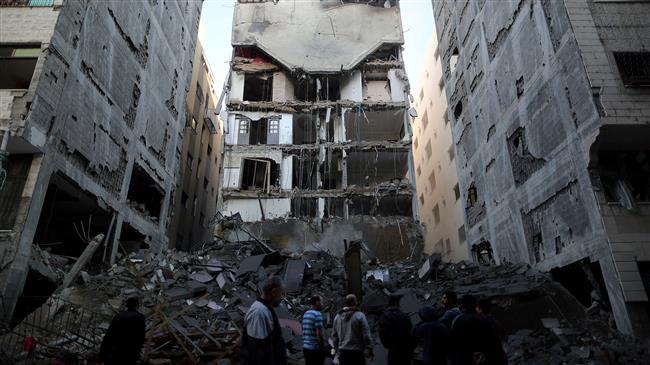Ex-Bahraini minister warns of joint Arab-Israel plot against Palestine
Bahrain’s former minister of education Ali Fakhro has criticized Saudi Arabia and its regional allies for their willingness to establish diplomatic relations with the Tel Aviv regime, arguing that such attempts would pave the way for the Israeli military to continuously target Palestinians.
“The Occupation regime (Israel) continues its efforts to get rid of Palestinians in the remaining parts of occupied lands,” Fakhro told Arabic-language Arabi 21 online newspaper, noting that Israel has usurped 85 percent of the historical Palestine, leaving “only 15 percent for 14 million Palestinians.”
“Israel enjoys full political support of the administration of US President Donald Trump, who is overly eager to put an end to the existence of the Palestinian cause,” he pointed out
“There is a large and complicated conspiracy aimed at getting rid of the Palestinian cause,” he said, stressing that all “justifications” given for the normalization of ties with Israel are “originally meant to liquidate the Palestinian cause.”
Fakhro also criticized intensive contacts between Arab and Israeli officials, emphasizing that internal Palestinian disputes have facilitated certain Arab states’ efforts to forge ties with the Israeli regime.
A senior official of the Lebanese Hezbollah resistance movement recently the fact that Persian Gulf kingdoms are dramatically warming their relations with the Tel Aviv regime after secret contacts is a decision dictated to them by the Saudi regime.
“Persian Gulf states' attempts at normalizing ties with Israel is a decision made by the royal Saudi family, because Crown Prince Mohammed bin Salam is currently facing numerous crises, namely the war on Yemen, the murder of prominent dissident journalist Jamal Khashoggi as well as internal and external challenges. He is pinning hope on the Israeli regime in order to save himself,” Deputy Chairman of Hezbollah's Executive Council Sheikh Nabil Qaouq said.
He said the willingness shown by Saudi Arabia and its regional allies to establish diplomatic relations with the Tel Aviv regime has exceeded all expectations of Israeli officials, with Prime Minister Benjamin Netanyahu saying he was not dreaming the day would come when he sees normalized ties with Persian Gulf kingdoms.
Israeli Transportation and Intelligence Minister Yisrael Katz visited Oman on November 4 to attend an international transport conference and pitch a railway project that would link the Persian Gulf to the Mediterranean via Israeli-occupied territories.
The trip came on the heels of a surprise visit by Israeli Prime Minister Benjamin Netanyahu to Oman late last month, where he met Sultan Sayyid Qaboos bin Said Al Said at the Bait al-Barakah Royal Palace in the coastal city of Seeb near the capital Muscat.
Israel’s English-language daily newspaper The Jerusalem Post reported that the two men discussed ways to advance the so-called Middle East peace process as well as a number of issues of mutual interest with regard to the region’s stability.
Netanyahu was accompanied by senior officials, including the head of the Mossad spy agency and his national security adviser.
Netanyahu's unpublicized visit to Oman came on the same day that Israeli Culture and Sports Minister Miri Regev traveled to the United Arab Emirates (UAE) to accompany Israel’s judo team at the Abu Dhabi Grand Slam 2018.
Regev arrived in Abu Dhabi on October 26, and she participated in the opening ceremony of the international event at the Emirati capital’s Zayed Sports City, Palestinian Arabic-language Ma’an news agency reported.

Her visit to the UAE marked the first of its kind by an Israeli minister to a Persian Gulf littoral state.
Tel Aviv and Abu Dhabi have no diplomatic ties and the UAE does not recognize Israel, but the two sides have increased backchannel cooperation in recent years. There have been numerous reports of growing contacts between Saudi and Israeli officials too.
Among Arab countries, Israel has diplomatic relations only with Egypt and Jordan.
Saudi Arabia has hostile ties with resistance movements in the Palestinian territories, including Hamas which is fighting the Israeli occupation.
‘All wars have rules. All of those rules have been broken’ by Israel
VIDEO | Report flags India’s violation of rights of Rohingya detainees
Turkey's foreign minister meets Syria's de facto leader in Damascus
'Next to impossible' to rescue patients from Gaza's Kamal Adwan Hospital: Director
VIDEO | Vietnam current prosperity
Report blames gasoil exports for shortage at Iranian power plants
VIDEO | Hind Rajab Foundation names Israeli war criminals vacationing after Gaza genocide
VIDEO | Australians rally for Gaza ahead of Christmas festivities





















 This makes it easy to access the Press TV website
This makes it easy to access the Press TV website